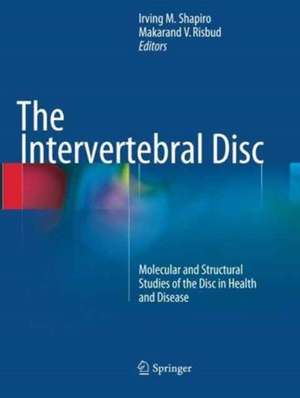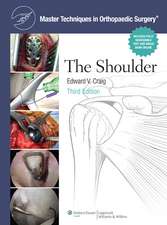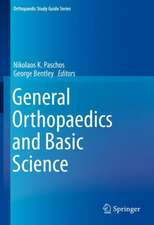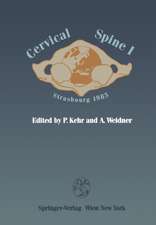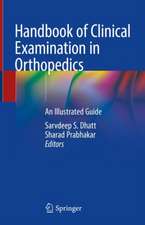The Intervertebral Disc: Molecular and Structural Studies of the Disc in Health and Disease
Editat de Irving M. Shapiro, Makarand V. Risbuden Limba Engleză Paperback – 23 aug 2016
Written by leading scientists and clinicians, the first part of the book provides a review of the basic biology of the disc in health and disease. The second part considers strategies to mitigate the effects of disc degeneration and discusses the possibility of engineering replacement tissues. The final section is devoted to approaches to model normal development and elucidate the pathogenesis of degenerative disc disease using animal, organ and cell culture techniques.
The book bridges the gap between the basic and clinical sciences; the target audience includes basic scientists, orthopaedists and neurologists, while at the same time appealing to the needs of graduate students, medical students, interns and fellows.
| Toate formatele și edițiile | Preț | Express |
|---|---|---|
| Paperback (1) | 817.24 lei 38-44 zile | |
| SPRINGER VIENNA – 23 aug 2016 | 817.24 lei 38-44 zile | |
| Hardback (1) | 1168.39 lei 38-44 zile | |
| SPRINGER VIENNA – 13 sep 2013 | 1168.39 lei 38-44 zile |
Preț: 817.24 lei
Preț vechi: 860.24 lei
-5% Nou
Puncte Express: 1226
Preț estimativ în valută:
156.39€ • 162.29$ • 130.72£
156.39€ • 162.29$ • 130.72£
Carte tipărită la comandă
Livrare economică 11-17 martie
Preluare comenzi: 021 569.72.76
Specificații
ISBN-13: 9783709119433
ISBN-10: 370911943X
Pagini: 456
Ilustrații: X, 446 p. 130 illus., 42 illus. in color.
Dimensiuni: 210 x 279 mm
Ediția:Softcover reprint of the original 1st ed. 2014
Editura: SPRINGER VIENNA
Colecția Springer
Locul publicării:Vienna, Austria
ISBN-10: 370911943X
Pagini: 456
Ilustrații: X, 446 p. 130 illus., 42 illus. in color.
Dimensiuni: 210 x 279 mm
Ediția:Softcover reprint of the original 1st ed. 2014
Editura: SPRINGER VIENNA
Colecția Springer
Locul publicării:Vienna, Austria
Cuprins
Biomechanical and Molecular Studies of the Intervertebral Disc: Introduction to the Structure, Function and Comparative Anatomy of the Vertebrae and the Intervertebral Disc.- The Intervertebral Disc: Overview of Disc Mechanics.- Development of the Intervertebral Disc.- Proteoglycans of the Intervertebral Disc.- Collagen and Other Proteins of the Nucleus Pulposus, Annulus Fibrosus and Cartilage Endplates.- Microenvironmental Regulation of Cell Function and Extracellular Matrix Synthesis by Disc Cells.- The Effects of Mechanical Forces on Nucleus and Annulus Cells.- The Role of the ADAMTS Proteins in the Intervertebral Disc.- Intervertebral Disc Disease: Pathogenesis and Current Treatment Modalities: Epidemiology of Lumbar Disc Degeneration.- Genetic Basis of Intervertebral Disc Degeneration.- Pathogenesis of Intervertebral Disc Degeneration.- Imaging Modalities for Studying Disc Pathology.- Surgical Indications for Lumbar Degenerative Disease.- Spinal Motion Restoration Devices for the Degenerate Disc.- The Non-Surgical Treatment of Back Pain.- Back Pain and Disc Degeneration: Are They Linked?- Clinical Features and Pathobiology of Chordoma.- Models of Disc Disease and Biological Regeneration: Large Animal Models of Disc Degeneration.- Intervertebral Disc Herniation.- The Sand Rat (Psammomys obesus obesus) Model of Spontaneous, Age-Related Intervertebral Disc Generation.- Use of Knockout and Transgenic Mouse Models in Disc Research.- Intervertebral Disc Culture Models and Their Applications to Study Pathogenesis and Repair.- Use of Stem Cells to Regenerate the Disc.- Gene Therapy Approaches for Disc Regeneration.- Enhancing Disc Repair by Growth Factors and Other Modalities.- Tissue Engineering of the Disc.
Notă biografică
Irving M. Shapiro BDS, PhD
Makarand Risbud, Ph.D.
Division of Orthopaedic Research, Jefferson Medical College, Thomas Jefferson University, Philadelphia, PA, USA
Makarand Risbud, Ph.D.
Division of Orthopaedic Research, Jefferson Medical College, Thomas Jefferson University, Philadelphia, PA, USA
Textul de pe ultima copertă
The intervertebral disc is composed of a complex tissue that separates neighboring vertebrae, permits a wide range of motion, and cushions the high biomechanical forces on the spine. Disc degeneration leads to a loss of function and is often associated with excruciating pain.
Written by leading scientists and clinicians, this is the only book in the past fifty years devoted entirely to the study of the intervertebral disc. The first part of the book provides a review of the basic biology of the disc in health and disease. The second part considers strategies for mitigating the effects of disc degeneration and discusses the possibility of engineering replacement tissues. The final section is dedicated to approaches that model normal development, and the elucidation of the pathogenesis of degenerative disc disease using animal, organ and cell culture techniques.
This unique and authoritative book bridges the gap between the basic and clinical sciences; its target audience includes basic scientists, orthopedists, neurologists, rehabilitation and physical therapists, primary care physicians and chiropractors, while it also addresses the needs of graduate students, medical students, interns, fellows, and patients who suffer from disc-related pathologies.
Written by leading scientists and clinicians, this is the only book in the past fifty years devoted entirely to the study of the intervertebral disc. The first part of the book provides a review of the basic biology of the disc in health and disease. The second part considers strategies for mitigating the effects of disc degeneration and discusses the possibility of engineering replacement tissues. The final section is dedicated to approaches that model normal development, and the elucidation of the pathogenesis of degenerative disc disease using animal, organ and cell culture techniques.
This unique and authoritative book bridges the gap between the basic and clinical sciences; its target audience includes basic scientists, orthopedists, neurologists, rehabilitation and physical therapists, primary care physicians and chiropractors, while it also addresses the needs of graduate students, medical students, interns, fellows, and patients who suffer from disc-related pathologies.
Caracteristici
Comprehensive approach to recent research results on disc de- and regeneration Numerous 4c illustrations Contributions of international authors
